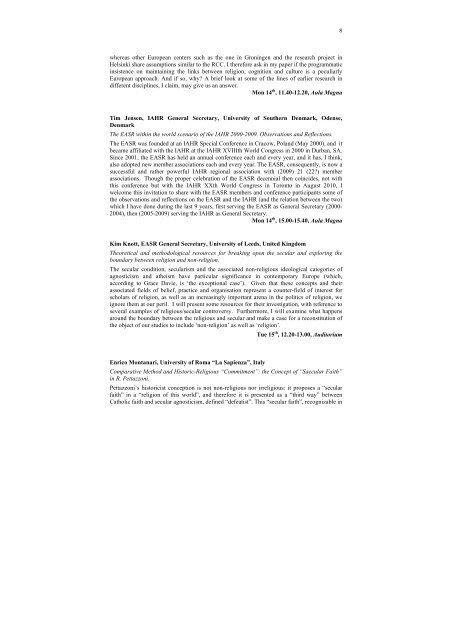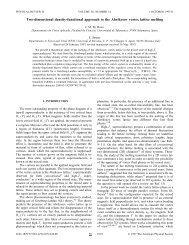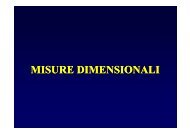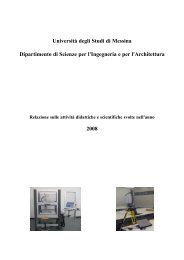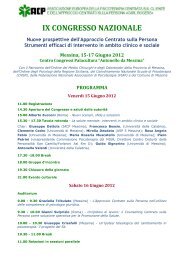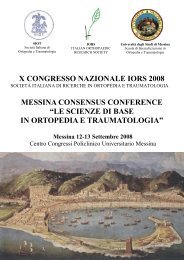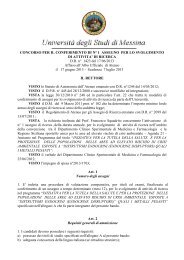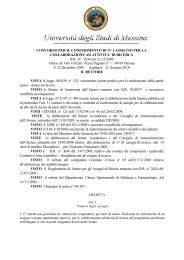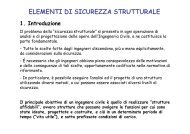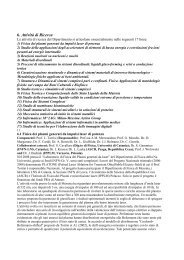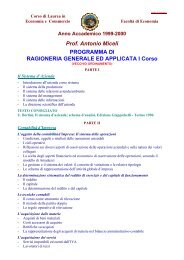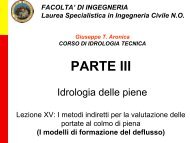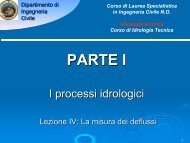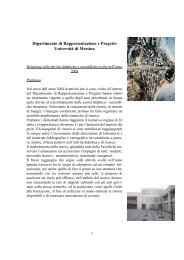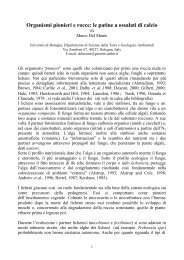PROGRAMME AND ABSTRACTS - Università degli Studi di Messina
PROGRAMME AND ABSTRACTS - Università degli Studi di Messina
PROGRAMME AND ABSTRACTS - Università degli Studi di Messina
Create successful ePaper yourself
Turn your PDF publications into a flip-book with our unique Google optimized e-Paper software.
whereas other European centers such as the one in Groningen and the research project in<br />
Helsinki share assumptions similar to the RCC. I therefore ask in my paper if the programmatic<br />
insistence on maintaining the links between religion, cognition and culture is a peculiarly<br />
European approach. And if so, why? A brief look at some of the lines of earlier research in<br />
<strong>di</strong>fferent <strong>di</strong>sciplines, I claim, may give us an answer.<br />
Mon 14 th , 11.40-12.20, Aula Magna<br />
Tim Jensen, IAHR General Secretary, University of Southern Denmark, Odense,<br />
Denmark<br />
The EASR within the world scenario of the IAHR 2000-2009. Observations and Reflections.<br />
The EASR was founded at an IAHR Special Conference in Cracow, Poland (May 2000), and it<br />
became affiliated with the IAHR at the IAHR XVIIIth World Congress in 2000 in Durban, SA.<br />
Since 2001, the EASR has held an annual conference each and every year, and it has, I think,<br />
also adopted new member associations each and every year. The EASR, consequently, is now a<br />
successful and rather powerful IAHR regional association with (2009) 21 (22?) member<br />
associations. Though the proper celebration of the EASR decennial then coincides, not with<br />
this conference but with the IAHR XXth World Congress in Toronto in August 2010, I<br />
welcome this invitation to share with the EASR members and conference participants some of<br />
the observations and reflections on the EASR and the IAHR (and the relation between the two)<br />
which I have done during the last 9 years, first serving the EASR as General Secretary (2000-<br />
2004), then (2005-2009) serving the IAHR as General Secretary.<br />
Mon 14 th , 15.00-15.40, Aula Magna<br />
Kim Knott, EASR General Secretary, University of Leeds, United Kingdom<br />
Theoretical and methodological resources for breaking open the secular and exploring the<br />
boundary between religion and non-religion.<br />
The secular con<strong>di</strong>tion, secularism and the associated non-religious ideological categories of<br />
agnosticism and atheism have particular significance in contemporary Europe (which,<br />
accor<strong>di</strong>ng to Grace Davie, is ‘the exceptional case’). Given that these concepts and their<br />
associated fields of belief, practice and organisation represent a counter-field of interest for<br />
scholars of religion, as well as an increasingly important arena in the politics of religion, we<br />
ignore them at our peril. I will present some resources for their investigation, with reference to<br />
several examples of religious/secular controversy. Furthermore, I will examine what happens<br />
around the boundary between the religious and secular and make a case for a reconstitution of<br />
the object of our stu<strong>di</strong>es to include ‘non-religion’ as well as ‘religion’.<br />
Enrico Montanari, University of Roma “La Sapienza”, Italy<br />
8<br />
Tue 15 th , 12.20-13.00, Au<strong>di</strong>torium<br />
Comparative Method and Historic-Religious “Commitment”: the Concept of “Saecular Faith”<br />
in R. Pettazzoni.<br />
Pettazzoni’s historicist conception is not non-religious nor irreligious: it proposes a “secular<br />
faith” in a “religion of this world”, and therefore it is presented as a “third way” between<br />
Catholic faith and secular agnosticism, defined “defeatist”. This “secular faith”, recognizable in


